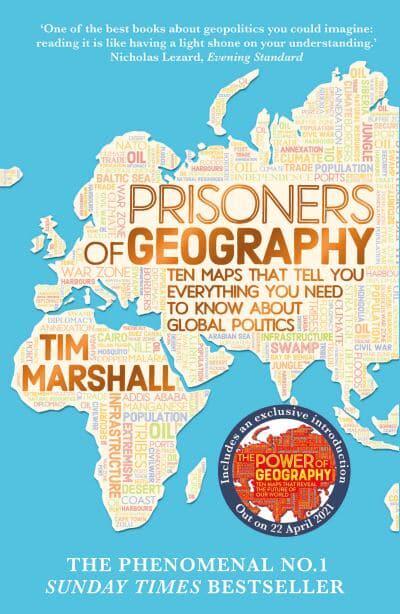Tim Marshall's Geographical Prisons

I read Tim Marshall’s Prisoners of Geography a while ago, but it keeps coming up, indirectly, in conversations. The ongoing invasion of Ukraine by Russia, the genocidal expansionist aggression of Israel, resource conflicts in Sudan and elsewhere – they all lead to the hows and whys behind such violence. Tim Marshall’s book offers a somewhat simplistic answer, one that readers may be too quick to accept because it’s sometimes easier to have an answer than none. The alternative may send you going round in existential circles about human nature, the complexity of modernity, the general impotence citizens feel in supposedly democratic countries and our complicity in murder happening in distant lands. Especially in the middle of winter, when the food on our tables and the gas heating our homes is dependent on those distant lands.
Marshall offers an A-level Geography approach to understanding international aggression, resource hunger and national boundaries. In crude terms, for example, he takes the Urals as a natural line of defence between Russia and Europe, which necessitates Russian expansion west – into the middle of Ukraine. This, like many of Marshall’s readings, makes sense from a bird’s eye view, but in practice the purely geographical optic ignores a whole host of other factors.
First: the madness of oligarchs, like Putin (cf. Erdogan, Orbán, Netanhayu… Trump… Starmer…), needs to be understood in fresh light. Increasingly frequent natural disasters and the precarity of resources like coltan and lithium in turn causes wars, which drive immigration. This mechanism shifts the Overton window and fuels toxic populist arguments, even among traditionally left-leaning governments (cf. Starmer and Ashworth throwing Bangladeshi and Indian immigrants – among others – under a bus in the run up to the General Election here; it lost Ashworth his seat and Starmer a significant majority).
There’s a curious thread in Rutger Bregman’s Human Kind that suggests the invention of property and assets, enabled individuals with sociopathic tendencies to leverage their power over others through precarity mechanisms. Pre-settlement, pre-ownership societies solved problems by collectively sharing the guilt of removing such individuals from society, often with violence.
Second: the complexity of resource control of supply and demand. Marshall’s book simply didn’t cover this sufficiently for me because it was too entrenched in reading the status quo generically. As the pandemic, climate crisis and other massive global challenges have shown, people and societies shift out of necessity due to emergencies. The problem at the moment is that governments are fighting tooth and nail to extend the lifespan of fossil fuel resource access and dependent technologies instead of transitioning safely and quickly.
Yet some societies, smaller, less able to conduct overseas wars, are forced to transition or already excist outside of petrocapitalism. Parts of the global south, even poorer parts of southern Europe, have already learned how to cope without a stable energy supply, through drought, flood, pestilence and famine. These crises stress systems and kill people, but they also demonstrate communities primed for change or already changing to develop resilience against increasingly volatile conditions. Marshall’s book doesn’t look at the detail of such resilience. Sweeping this stuff aside in favour of richer national sovereignty limits the temporal range of the perspective massively, particularly in light of more frequent mega storms, crop failures and similar climate-driven disasters. I can’t accept any perspective that ignores the elitist power dynamics and the potential for mass resistance to change things.
Even just writing that out tells me it’s too complex to boil down easily, which is further evidence that Marshall’s reductive approach is too limited.
Third: actually, yes, climate change is handled badly. A useful example lies in Russia’s need for access to international waters via a port where the seas don’t freeze over in winter. Hence Russia’s invasions of Crimea and Georgia, to gain access to international waters via those nations’ warmer, southern coasts. How is this going to change over the next 20-50 years, with average sea temperatures fluctuating? The absence of a solid discussion frustrated me, not because I expected Marshall to have answers, but more for the fact that it’s evidence of the work he hasn’t done in other parts of the book.
Fourth: there’s no discussion of supra-national power. Where are the multinational companies driving climate change? Where is the oil lobby, where are the global manufacturing giants, the technocratic conglomerates, with their lack of corporate responsibility? When you’re talking about economies larger than many nations, you’re talking about capitalism and the Capitalocene (see Jason W Moore on this) as a greater driver of planetary conditions and relations than geography. It doesn’t fit Marshall’s thesis, which is that the bare bones of geography shape our national behaviours above all.
See also in Jason Moore’s work: an argument that food drives colonialism through an equation of ecology = economy. He has some very convincing essays on the difference between Asian nations’ dependency on rice compared to Europe’s wheat. (E.g. essays on that page on Braudel, or commodity frontiers.)
I sometimes wonder how much of this is down to the clickbait packaging publishers’ marketing departments bring to books. This kind of marketing borders on mis-selling or misleading, putting profits over people. It undermines the caveats and hedging that makes an otherwise exaggerated and contentious argument palatable. This then locates the debate in the context of ‘the one book you have to read’ rather than in the wider landscape of multiple perspectives and texts.
Marshall makes a partially valid contribution here, bringing geography to bear on relations between neighbouring states. It’s one of many factors, undoubtedly, but there’s no attempt to unpick the complexity within this, or relate geography to other factors. There’s no discussion of counter examples, where nations have undoubtedly behaved in ways that run against geography. Not that I can list them, but noting the omission, the book’s overall argument becomes unbalanced and makes me increasingly suspicious of its more plausible claims.
While there’s a case to be made for more detail following in the sequels to Prisoners… I wasn’t sufficiently convinced to buy into another exposition of oversimplified geopolitics. In fact, the serialisation suggests the opposite to me: capitalism chasing its bottom line, rather than quality. Obviously that’s a conscious bias in me, but one I’m happy to pin on a sleeve.


